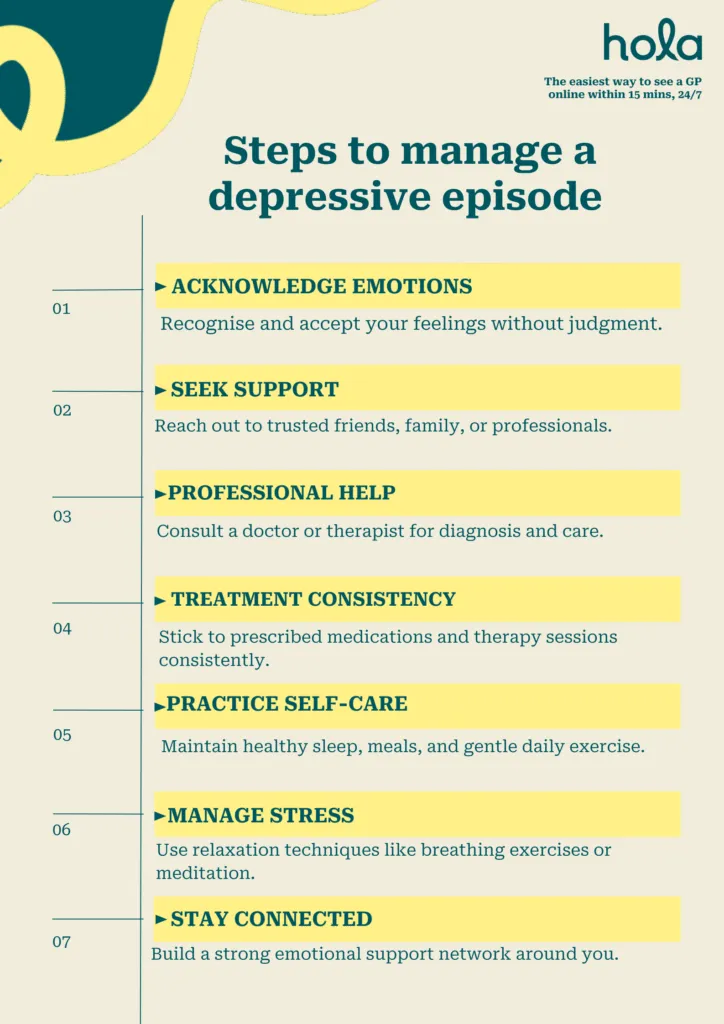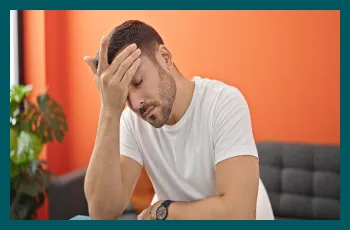Short vs. long depressive episodes: What’s normal?
Written by editorial staff writer at Hola. Medically reviewed by Amira Shah, MA in Counselling Psychology, Registered Psychotherapist.

Contents

Summary: Short depressive episodes are temporary mood drops often triggered by specific life events, while long episodes may signal a mental health condition like clinical depression. Understanding the difference helps you take the right steps. If symptoms continue for more than two weeks and significantly impact daily life, seeking help is essential. Gaining insight into your mental health is key to feeling better.
Some days feel grey—and that’s perfectly normal. We all go through emotional dips, whether it’s a gloomy Monday or a rough patch in life. But how do you know if it’s just a passing cloud or something more serious? Between 2020 and 2022, 7.5% of Australians aged 16 to 85 experienced a 12-month affective disorder, with depressive episodes being the most common1. Let’s explore the difference between short and long depressive episodes to help you better understand your emotions and recognise when to reach out for help.
What is a depressive episode?
A depressive episode refers to a timeframe when an individual undergoes deep feelings of sadness, despair, and a disinterest in activities they once found pleasurable. During such a phase, the person may feel fatigued, encounter difficulties with sleep or oversleeping, have trouble focusing, and observe variations in their appetite or weight. They may experience feelings of worthlessness or guilt and occasionally contemplate death or self-harm. A depressive episode can persist for several weeks or months, profoundly impacting everyday life, work, and interpersonal relationships.What are the common signs & symptoms
Typical indicators and symptoms of a depressive episode include:- Enduring sadness or a low mood that predominates most of the day
- Diminished interest or enjoyment in previously liked activities
- Experiencing fatigue or decreased energy levels
- Variations in appetite or weight (either decrease or increase)
- Excessive sleeping or difficulties in falling asleep
- Challenges in focusing, making choices, or recalling information
- Feelings of guilt, worthlessness, or hopelessness
- Agitation or slowed physical movement and speech
- Thoughts related to death, self-inflicted harm, or suicide
What’s considered a short depressive episode?
A brief depressive episode typically last at least 2 weeks but less than two months. Clinical guidelines state that a depressive episode is diagnosed when symptoms, such as low mood and loss of interest, persist for at least two weeks. If there is an improvement in these symptoms within several weeks or up to a less than two months, it may be regarded as a temporary or short depressive episode. Even a brief episode can significantly affect daily life and personal well-being, so it’s important to seek help promptly. If symptoms continue for over two months or frequently recur, it may suggest a more persistent or severe type of depression that necessitates ongoing treatment.What’s considered a long depressive episode?
A prolonged depressive episode is generally defined as one that persists for several months or longer, usually lasting two months or more, according to diagnostic criteria. When symptoms like enduring sadness, lack of interest, fatigue, and other signs continue without significant improvement over this length of time, it may be categorised as a chronic or major depressive episode. Extended depressive episodes can crucially impair an individual’s daily functioning, relationships, and overall quality of life. They often require consistent treatment, including therapy, medication, or a combination of the two. If left untreated, a lengthy depressive episode may heighten the risk of complications, including anxiety, substance abuse, or additional health issues.Ready for positive change? Start your mental health care plan here.
Book an appointment
Fully bulk-billed, across Australia.
What factors influence duration
Numerous factors can impact the duration of a depressive episode:- The intensity of symptoms is a significant factor; more severe depression tends to last longer and can be more challenging to recover from.
- Prompt treatment is vital; initiating therapy, medication, or both at an early stage can shorten the episode's duration.
- The existence of a support system is crucial; a robust network of family, friends, or professionals can facilitate quicker recovery.
- Preexisting health issues, such as chronic illnesses or other mental health disorders, can extend the duration of depression.
- Stressful life circumstances or persistent challenges, such as job loss, relationship troubles, or financial difficulties, may prolong the episode.
- Genetic predispositions and biological factors can also influence episode length and severity.
- Personal coping mechanisms and resilience levels affect how quickly one recovers.
- Access to quality mental health care plays a crucial role in recovery speed.
Steps to manage a depressive episode
Handling a depressive episode incorporates several key strategies that can alleviate symptoms and aid recovery.- It’s essential to acknowledge and embrace the emotions you are experiencing rather than dismissing or denying them. Recognising that depression is a medical condition can help alleviate feelings of self-blame.
- Pursue professional assistance from a doctor, therapist, or counsellor. They can offer a diagnosis and suggest treatment options, including therapy, medication, or a combination.
- Adhere closely to your treatment plan. This entails regularly attending therapy sessions, taking prescribed medications as directed, and maintaining open communication with your healthcare provider about your feelings.
- Establish a support system by contacting reliable friends or family members. Expressing your emotions and receiving support can have a significant impact.
- Ensure that you focus on self-care by sticking to a consistent sleep routine, consuming healthy meals, and including exercise in your daily activities.
- Make an effort to reduce stress and engage in relaxation practices such as deep breathing, meditation, or mindfulness to help alleviate anxiety and negative thoughts.

How Hola Health can help
Hola Health can assist you during a depressive period by providing quick, convenient, and entirely online mental health services customised to your requirements. If you're feeling down, you can connect with a licensed physician through their platform to develop a bulk-billed Mental Health Treatment Plan, granting you access to Medicare-subsidised sessions with a psychologist. Consultations occur through secure video calls, so you don't have to leave your home or wait weeks for an appointment. Hola Health also offers personalised support for depression, which may encompass therapy, lifestyle guidance, and medication when necessary. Their user-friendly app allows you to manage prescriptions, referrals, and follow-up care all in one place. With expert-approved self-care resources and flexible access to professional assistance, Hola Health simplifies taking the initial step toward improved well-being, especially during a depressive episode when you require support that integrates into your life.Conclusion:
From small emotional setbacks to deeper challenges, your feelings are important, and assistance is always accessible. The more you understand your emotional waves, the easier it becomes to manage them. You’re not alone in this—brighter days are coming.FAQs
How long does a typical depressive episode last?
A typical depressive episode can last at least two weeks, but many continue for months without proper care. Some may resolve sooner, especially if triggered by a specific situation, while others, especially in clinical depression, can go on for six months or longer. Early intervention can ease the symptoms and aid recovery.When should I see a doctor about depression?
If you’ve been feeling low, hopeless, or disconnected from things you usually enjoy for over two weeks, or if these feelings affect your everyday life, rest, appetite, or personal connections, it’s important to speak with a doctor. If you’re having thoughts of self-harm or suicide, please seek immediate support.Can depressive episodes come and go?
Yes, depressive episodes can be temporary and return periodically. Some individuals go through phases of low mood followed by times of feeling fine, while others may face longer or more repeated episodes. Tracking your emotions and seeking help can help manage these ups and downs.What treatments are available for long-lasting depression?
Treatment options often involve therapy (such as CBT or cognitive behavioural therapy), medications, lifestyle changes, and sometimes support groups. In more serious cases, approaches like electroconvulsive therapy (ECT) or newer treatments may be considered. A doctor can help design a plan that fits your purpose.How can I manage depression at home?
You can start with these helpful steps:- Maintain a consistent sleep routine
- Stay physically active
- Eat balanced meals
- Practice mindfulness
- Create small, achievable daily goals
- Stay connected with friends and family
- Seek professional help when needed
How do I support a loved one going through a depressive episode?
Supporting a loved one through a depressive episode can feel challenging, but here are a few simple ways:- Be present and listen without judgment
- Be patient and understanding, healing takes time
- Help with daily tasks if they’re struggling
- Respect their boundaries
- Keep in touch to show you care
- Encourage them to speak to a professional
Can online mental health services help with depression?
Yes, online mental health services can help with depression. They offer convenient access to therapy, counselling, and support from mental health experts. They are especially useful for those who value privacy, have busy schedules, or live far from in-person care. Many people find online care effective in coping with depression.Take control of your mental health. Begin your care plan now.
Book an appointment
Fully bulk-billed, across Australia.
What we treat
- Cough
- Nausea & vomiting
- Fever
- Hayfever
- Fatigue
- Sore throat
- Acne
- Hair loss
- Gout
- Eczema
- Rosacea
- Sunburn
- UTI
- Erectile dysfunction
- Contraception
- Morning sickness
- Morning after pill
- Prostate health
- Anxiety
- Depression
- Stress
- Grief & loss
- Antidepressants
- Premature ejaculation
- Asthma
- Blood pressure
- Blood thinners
- Diabetes
- Cholesterol
- Migraines & headaches
- Allergies
- Body ache
- Heartburn & reflux
- Sleep disorder
- Pain relief
- Gastro
Related Articles
What Is Online Therapy? Everything You Need To Know About e-Therapy
February 19, 2026Mental Health
...
Disclaimer
This blog is for general informational purposes only and does not indicate that Hola Health provides all treatments or preventive measures mentioned. It is not intended to be a substitute for professional medical advice. Always seek the guidance of your doctor or other qualified health professional with any questions you may have regarding your health or a medical condition. For emergencies please immediately contact 000. Any medical topics discussed are intended to educate, not to imply availability through Hola Health.
 Facebook
Facebook  X
X  Copy Link
Copy Link



